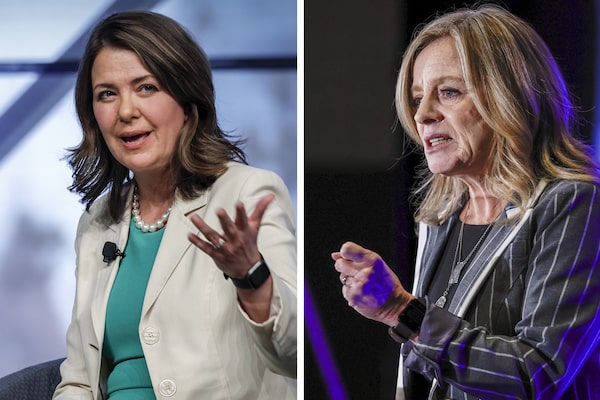
This compilation photo shows Premier Danielle Smith (left) as she speaks at an economic forum in Calgary on April 18, and NDP Opposition Leader Rachel Notley as she addresses the Calgary Chamber of Commerce on Dec. 15, 2022.Jeff McIntosh/The Canadian Press
The writ is expected to drop Monday in Alberta for an election campaign that effectively began weeks ago with both Danielle Smith’s United Conservatives and Rachel Notley’s New Democrats warning of the dystopian future should their opponents triumph.
Polls suggest the battleground for the May 29 vote is clearly defined.
The UCP was bleeding support in its traditional rural strongholds over former premier Jason Kenney’s COVID-19 health restrictions and vaccine mandates.
The bleeding has stopped, with support flooding back under Smith’s strong stance against COVID-19 rules along with her decision to fire the board of Alberta Health Services and dismiss the former chief medical officer of health, Dr. Deena Hinshaw.
Edmonton remains an NDP stronghold, leaving battleground Calgary as the pathway to victory or defeat.
The NDP would need to win big in a city that is traditionally conservative blue. Polls suggest it is possible, but the NDP would need help elsewhere to eke out a squeaker majority in the 87-seat legislature.
Pollster Janet Brown said UCP supporters are generally focused on the economy, money issues and believe the UCP is the best party to address that, while NDP supporters are focused more on health, education and social programs.
“Right down the middle is a thin group of undecided voters who, at this moment, think the UCP is better at the economy, think the NDP is better at social programs, but can’t decide which is more important to them right now,” Brown said in an interview.
“They can’t decide what’s best, which is most important than right now. So for those people, it could come down to leadership.”
The NDP is trying to make it two wins out of the last three. Notley led the party to a surprising win in 2015 – the first for the NDP in Alberta – capitalizing on voter exhaustion with the entitlement and scandals of the governing Progressive Conservative party while benefiting from vote splits between the PCs and its right-wing rival, the Wildrose Party.
Those two conservative parties mended fences to defeat Notley as the new United Conservative Party in 2019. The UCP hopes to win re-election under Smith, who was voted in by the party after Kenney garnered a tepid endorsement in a leadership review last spring and quit.
Politicians on both sides have already hit the doors and pronounced policy promises, leaving unrepresented parties in the legislature, such as the Liberals and Alberta Party, fighting to crowbar their way into the public consciousness
Both Notley and Smith warn their rivals’ past actions signal future chaos.
Under Smith, the UCP has pushed controversial autonomy initiatives, such a provincial police force, tax collection agency and pension plan. It has also introduced a program to give breaks to oil companies to clean up abandoned wells – something they already have to do by law.
The UCP has shelved talk of all those changes until after the election, but the NDP says vote the UCP back in and they will happen. And then there’s the ethics commissioner investigation into Smith’s leaked phone conversation about an upcoming criminal trial with the accused.
“Danielle Smith, in the last six months, has demonstrated an ability to misspeak on multiple topics over and over and over again. She changes her position more than a basketball player. She is entirely unreliable,” Notley told reporters earlier this week.
The UCP, meanwhile, says if Albertans want to see how the future will look under the New Democrats, look at their nanny-state, job-killing, tax-hiking, carbon-taxing, budget-busting previous term in government. The NDP boosted the minimum wage, raised corporate income taxes and introduced a farm safety bill that brought tractor-led protests to the steps of the legislature.
Not only that, Smith told listeners on her Corus radio show recently that a vote for Notley is a vote for Prime Minister Justin Trudeau. Notley, she says, moves in lockstep with her federal counterpart Jagmeet Singh, who is in lockstep with Trudeau in hiking the consumer carbon tax.
“The federal Liberals, with their NDP backers, have made everything more expensive. They have to own that,” Smith said.
“If they cared about affordability, they would be advocating for this tax to go away, too.”
The prize is the right to govern a province that is back on the top of the royalty-revenue roller-coaster, with multibillion-dollar deficits replaced – for now – with multibillion-dollar budget surpluses in a province of 4.4 million.